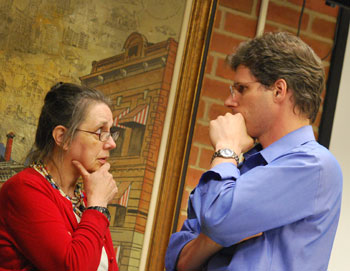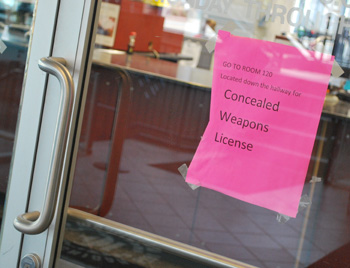I last saw Greg O’Dell at the November meeting of the University of Michigan board of regents. At the time, he was UM’s police chief and head of the department of public safety, a job he’d taken in August.
Greg O'Dell at the Nov. 17, 2011 University of Michigan regents board meeting, before his resignation as UM police chief.
We spoke only briefly, and he was polite and respectful – just as he’d been in all the other interactions I’d had with him. Though he seemed a bit more quiet and restrained that day, I thought nothing of it. After all, he’d taken on a significant high-profile responsibility, and was standing in a room full of his new bosses at a public meeting.
Just a few days later, I was surprised to learn that he had decided to resign from UM and return to a post he’d previously held at Eastern Michigan University. EMU had rehired Greg as police chief in late November, and his public statements indicated that he’d decided his position there was a better fit.
Less than a month after that, on the Friday before Christmas, Greg was found dead from a self-inflicted gunshot wound, an apparent suicide. He was 54. Shocking is the only way to describe the news – a sentiment I’ve heard expressed repeatedly over the last few days.
As a respected and well-liked leader in local law enforcement – he had spent the bulk of his career with the Ann Arbor police department – Greg was well known throughout the community. That fact was reflected in the hundreds of people who came to pay their respects on Wednesday night at the visitation held at the Nie Family Funeral Home, a diverse crowd of family, friends, colleagues and acquaintances.
He was smart and easy-going with a wry sense of humor, professional yet personable, confident and approachable. His death has stunned us, and even those of us who weren’t close to him will mourn the loss.
I’m sure I’m not alone in spending much of the past few days reflecting on Greg’s death. Not well-known outside a limited community was his struggle with depression. I don’t know the circumstances of his personal situation – and it’s not my business. But as the daughter of someone who suffered from chronic depression, that dark landscape is familiar to me.
This past summer, in the same regents boardroom where I last saw Greg, the director of UM’s Depression Center, John Greden, spoke to regents about the difficulty of fighting the stigma of this illness called depression. In the wake of Greg’s death, it’s worth pausing to reflect on the way that nearly all of us, at some point, grapple with our inner demons or unfathomable despair, and how those struggles can be even more profound for those who work in law enforcement. [Full Story]







